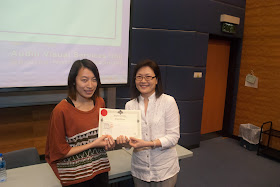 |
| 位於重丁天主教堂旁的任安守神父墓 |
香港電台RTHK紀錄片《文化長河-山川行》第七集《喜樂山中》同樣由本系助理教授吳科萍擔任顧問。而本集的內容正是Dr. WU近年研究的重點:怒江傈僳族的基督教信仰。
“怒江兩岸村子裡,有很多基督教教堂,是十九世紀初西方傳教士到來以後開始建造的。傈僳人沒有他們的文字,英國傳教士富能仁,當年為了方便傳道,便替傈僳人創
造了一套拼音文字,現時他們所用的聖經,也就沿用自這套傈僳文寫成的。後來基督教更成為傈僳人的主要宗教信仰,而他們的四聲部合唱,傈僳語無伴奏讚美詩,
更十分有名。
走到福貢,老姆登基督教堂前,看這山上、雲上的孩子上主日學、唱歌,在碧羅雪山和怒江的襯拓下,此情此景,好比天上人間。他們聖誕節是這樣慶祝的,每年城鄉裡一條村子會被選中,然後附近村子的教友便會過來,在教堂禱告唱歌,連續三天一起吃喝,十分熱鬧。
這裡的基督徒有不煙不酒的清規,因當年傳教士發現,貧窮的少數民族愛酒如命,窮得糧食不夠也要用糧食來釀酒,而煙酒也對身體不好,於是便訂下這規條,幫助他們解決糧食問題。另外當地還有個說法,就是因為他們窮得沒錢喝酒,於是便走去當基督徒了。
不能喝酒,對少數民族來說,可能己經是基督教給他們最大的挑戰。怒江就是一個給你充滿基督教味道的地方。”
觀看本集節目,請訪問香港電台的網站。






















